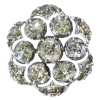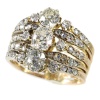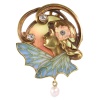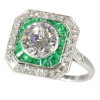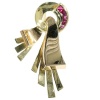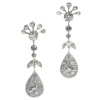We offer layaway, spread payments on the piece of your dreams. Ask us for details. Free insured shipping on all orders !!!
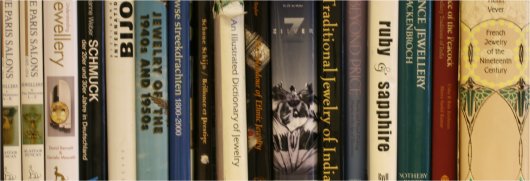
Antique jewelry glossary
Welcome to our extensive antique jewelry glossary with around 1,500 jewelry related entries.If you feel you are missing an explanation, feel free to let us know and we will add it.
A - B - C - D - E - F - G - H - I - J - K - L - M - N - O - P - Q - R - S - T - U - V - W - X - Y - Z all
Bacchus or Dionysus
Dionysus or Dionysos in Greek; associated with Roman Liber, is the god of wine, the inspirer of madness, and a major figure of Greek mythology. He represents not only the intoxicating power of wine, but also its social and beneficial influences. The geographical origins of his cult were unknown, but almost all myths depicted him as having "foreign" (i.e. non-Greek) origins.
He was also known as Bacchus and the frenzy he induces, bakcheia. He is the patron deity of agriculture and the theatre. He was also known as the Liberator (Eleutherios), freeing one from one's normal self, by madness, ecstasy, or wine. The divine mission of Dionysus was to mingle the music of the aulos and to bring an end to care and worry. Scholars have discussed Dionysus' relationship to the "cult of the souls" and his ability to preside over communication between the living and the dead.
In Greek mythology Dionysus is made to be a son of Zeus and Semele; other versions of the myth contend that he is a son of Zeus and Persephone. He is described as being womanly or "man-womanish".
The name Dionysos is of uncertain significance; its -nysos element may well be non-Greek in origin, but its dio- element has been associated since antiquity with Zeus (genitive Dios). Nysa, for Greek writers, is either the nymph who nursed him, or the mountain where he was attended by several nymphs (the Nysiads), who fed him and made him immortal as directed by Hermes.
Bacchanalia
Introduced into Rome (c. 200 BC) from the Greek culture of southern Italy or by way of Greek-influenced Etruria, the bacchanalia were held in secret and attended by women only, in the grove of Simila, near the Aventine Hill, on March 16 and 17. Subsequently, admission to the rites were extended to men and celebrations took place five times a month. The notoriety of these festivals, where many kinds of crimes and political conspiracies were supposed to be planned, led in 186 BC to a decree of the Senate — the so-called Senatus consultum de Bacchanalibus, inscribed on a bronze tablet discovered in Calabria (1640), now at Vienna — by which the Bacchanalia were prohibited throughout all Italy except in certain special cases which must be approved specifically by the Senate. In spite of the severe punishment inflicted on those found in violation of this decree, the Bacchanalia were not stamped out, at any rate in the south of Italy, for a very long time.
Dionysus is equated with both Bacchus and Liber (also Liber Pater). Liber ("the free one") was a god of fertility, wine and growth, married to Libera. His festival was the Liberalia, celebrated on March 17, but in some myths the festival was also held on March 5.
From: Wikipedia



